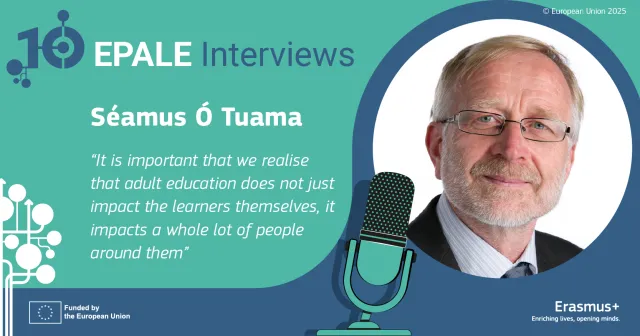AI for Inclusion: Opportunities for Low-Skilled Learners

Artificial Intelligence has transitioned from a futuristic concept to an integral aspect of modern life, reshaping industries, education, and interpersonal interactions. As automation becomes increasingly prevalent, the demand for skill development intensifies, particularly for individuals in low-skilled occupations. For many adults, especially those with lower-level skills, navigating the rapid pace of these advancements can be a daunting challenge.
The transformative potential of AI in adult learning offers unprecedented opportunities to address the specific needs of low-skilled learners. By enabling flexible, personalised learning experiences, AI can empower individuals to engage in training offers that are tailored to their needs. However, without careful design and implementation, there is a risk for adults with basic skills challenges to be excluded from these processes.
The Need for Inclusive Lifelong Learning
Across the EU, jobs are changing rapidly as AI and digital tools are becoming an increasingly prevalent part of work. According to the 2023 OECD Employment Outlook, two in five employers say that the lack of relevant skills is already holding back AI adoption in the workplace. While upskilling is a joint priority, not all learners start from the same place. For many low-skilled adults, digital learning tools can feel inaccessible or even intimidating. Past experiences of education - sometimes negative or discouraging- can also hold people back. Without targeted efforts to make learning welcoming and relevant, inequalities may grow, not shrink.
Policy plays a vital role in this respect. Investment in digital infrastructure is important, but so too is the human side - outreach, guidance, and inclusive support structures. Above all, learning programmes must be meaningful and accessible via flexible modes of completion to better fit the diverse background of the learners.
Tackling Uneven Access and Structural Gaps
Even as online learning expands, too many adults are still left out. A 2020 study by Kapetaniou shows that access to AI-enhanced education varies widely depending on geography, income, and infrastructure. In rural or low-income areas, limited internet access and outdated devices are still major hurdles.
However physical access is only part of the story. Cultural factors - like fear of failure, embarrassment around learning, or mistrust in digital systems - can make people hesitant to participate. For education providers, it’s vital to understand these emotional and social barriers, and to meet learners where they are.
Community-based learning centres, libraries, and trusted local organisations all have a key role to play. By co-creating programmes with learners and designing support that reflects real-life challenges, we can build more inclusive pathways that open doors rather than close them.
Building Confidence Through AI Literacy
Understanding AI is not only about acquiring a new technical skill - it serves as a foundation for confidence and participation in today’s world. For older adults or those with limited digital proficiency, learning the basics of how AI works can provide a gate to further development.
In a research article titled AI Literacy for an Ageing Workforce Chetty (2023) highlights how targeted AI literacy training can demystify algorithms, build trust, and reduce anxiety around digital change. These programmes work best when they use clear language, relatable examples, and practical activities. Whether it’s understanding how recommendation systems work or learning to detect bias in automated decisions, small steps can build significant confidence.
The format also matters. Blended approaches that mix face-to-face guidance with practical usage of technology tend to be more successful than standalone online courses. Additionally, guidance and support through mentoring, peer groups, or just a friendly environment can make an important contribution for someone re-engaging with learning.
The Workplace as a Learning Hub: AI’s Role
In many sectors, work-based learning is the first point of contact for digital skills development for adults. AI may serve as a powerful tool in this context: intelligent tutoring systems, adaptive learning apps, and skills assessment platforms are already being used to tailor training to individual needs.
AI, however, is not a one-size-fits-all solution. Research by Roumell & Jabarkhail (2023) reminds us that low-skilled workers often need clear guidance and encouragement to engage with learning at work. Without time, support from supervisors, or a learning culture, even the most advanced tools can prove ineffective.
The most successful models combine technology with human connection. Individualised coaching, community learning, and regular feedback help learners to maintain their focus and keep them on the learning pathway. When employers invest not just in platforms but in people, AI may become a valuable tool in creating more dynamic and inclusive learning environments.
Design Matters: Making AI Work for Everyone
One of the most overlooked issues in educational AI is design. If platforms are built for tech-savvy, highly literate users, they risk excluding those who need support the most. Verhagen (2021) argues that many AI tools assume a level of autonomy or fluency that simply does not reflect the diverse reality of adult learners.
From hard-to-navigate interfaces to content that’s only available in dominant languages, barriers can be subtle but significant. Furthermore, one may mention the risk of algorithmic bias, systems that unintentionally disadvantage certain groups based on background or data patterns.
To avoid these challenges, education technologies should be designed inclusively from the start. This may involve user testing with diverse learners, integrating accessibility features like voice interaction or translation, and building in feedback loops that allow real-time improvements. Effective design extends beyond functionality; it should also prioritise equity.
Considerations for Inclusive AI in Adult Learning
Several practical considerations could be addressed to ensure AI serves as a tool for inclusion within adult learning frameworks. These are not just technical considerations - they are social choices that shape who gets the chance to participate in the digital economy:
- Apply design principles considering the needs of low-skilled adults
- Support hybrid learning models that blend technology with human facilitation
- Encourage employer partnerships that embed learning into the job
- Listen to learners and involve them in shaping what and how they learn
Artificial Intelligence can better transform adult learning, if we design it with people’s needs in mind. For low-skilled learners, AI offers new routes into education and employment. However, without access, support, and thoughtful design, these routes may remain out of reach. As adult learning professionals, we have a critical role to play. By fostering inclusive learning environments, advocating for supportive policies, and ensuring that AI works for everyone, we can help turn digital disruption into opportunity - for all.
Let us know!
This autumn EPALE is launching an online course targeting AI with special attention to adult learning professionals.
Let your voice be heard by completing this survey. It provides us with an important contribution and insights with regards to needs of practitioners in this area.
Take the survey now!






This blog touches on a…
This blog touches on a crucial topic of how we can make AI and digital learning truly inclusive for all adults, not just for those who are already confident users of technology. I completely agree that low-skilled adults often face multiple barriers, both technical and emotional, when it comes to digital learning. It’s not only about tools it's about people and how we support them throughout their learning journey. I personally find this topic very interesting and important. I would love to see more opportunities in the future where every adult no matter their background, age, or digital skills can access high quality learning.